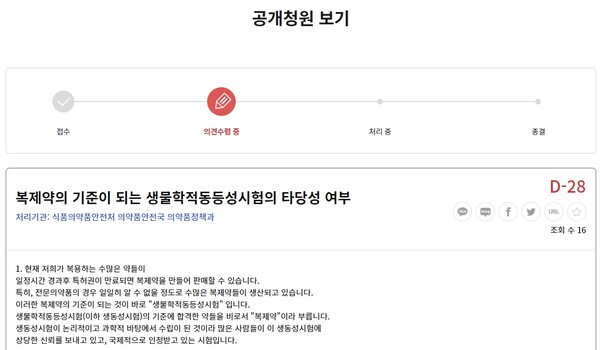
After Roche Korea decided to withdraw its Parkinson's syndrome cure, Madopar, Korean patients called for measures to ensure the public’s trust in the quality of generic drugs.
They also stressed the need to strengthen the standards for bioequivalence testing, which confirms the equivalence of generic drugs to the original drug.
Although the Ministry of Health and Welfare said it would strive to resupply Madopar “withdrawn from the domestic market, discussions on resupply have stalled. Since the supply stoppage, Parkinson's patients have been prescribed copycat drugs with proven bioequivalence but complain about side effects.

A recent posting on Petition24, an online public petition site, asked to "verify the validity of the bioequivalence test, the standard for generic drugs.” The petitioner claimed to have experienced side effects from taking generic drugs, which made her question the validity of bioequivalence testing. The petition is open for public comment until Oct. 6 before being tabled for discussion.
"I take medication every day. Some years ago, generic drugs began to be produced after originals’ patents expired,” said the petitioner, who has been suffering from Parkinson's syndrome for 20 years. “The emergence of generic drugs is a natural phenomenon, and I have been prescribed generic drugs that are relatively inexpensive. All of them have passed bioequivalence testing."
The petitioner said some generic drugs showed side effects not seen in the original drug, and some had different mechanisms of action that made patients suspicious. Among Parkinson's drugs, some, such as PK-Merz Tab, show the same effect as the original despite being a copycat, forcing patients to doubt the validity of the bioequivalence test, he added.
The petitioner requested that the Ministry of Food and Drug Safety activate a team of experts to validate bioequivalence testing.
"Even if a drug passes the bioequivalence test, it may have different effects and side effects. We want the government to see if anything else can be added to the bioequivalence test, if we need new standards, and create an international standard for bioequivalence recognized worldwide," the petitioner said.
He noted that the biggest fear of Parkinson's patients is that the original drug manufacturers will withdraw from Korea due to poor-quality generics.
"No matter how cheap the drug is, if one has to take a poor-quality generic instead of a good one, who will accept it?" he said. “This is the fear of Parkinson's patients now, but shortly, it will be the fear of all Koreans who take generic drugs for other diseases.”

